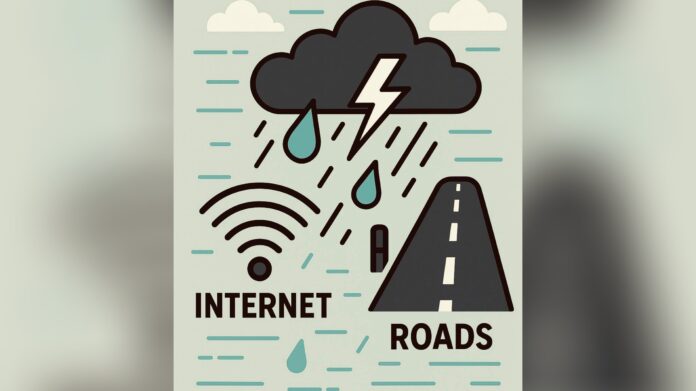Srinagar: Torrential rainfall has once again exposed the fragility of Jammu and Kashmir’s infrastructure, with widespread internet outages and road blockages plaguing the region.
Heavy rains over the past week have caused significant damage to optical fiber lines, leading to a near-total communication blackout across the Union Territory, while landslides and mudslides have severed key highways, isolating communities and hampering relief efforts.
On August 26, network outages were reported across all major telecom providers, including Jio, Airtel, Vodafone, and state-owned BSNL, due to multiple fiber cuts triggered by relentless rainfall.
Chief Minister Omar Abdullah described the situation as “almost nonexistent communication,” likening it to the devastating floods of 2014 and the 2019 communication blackout following the abrogation of Article 370.
Although partial mobile and internet services were restored by August 27 after nearly 24 hours of disruption, connectivity remains unreliable, with subscribers reporting persistent issues even days later.
Reliance Jio announced a compensation package of three days of free data for affected users, but other providers, including BSNL and Airtel, have remained silent on similar measures, drawing public ire.
“It feels like we’re living in the Stone Age. Just two days of rain, and we’re cut off from the world,” said Bilal Ahmad, a Pampore resident running an online business. Students, businesses, and emergency services have been hit hardest, with many unable to access critical online resources or contact families.
Road connectivity has fared no better. The Jammu-Srinagar National Highway, a vital lifeline connecting the Valley to the rest of the country, was closed on September 3 due to landslides, mudslides, and shooting stones at multiple locations. Other major routes, including the Mughal Road, Srinagar-Sonamarg-Ganderbal (SSG) Road, and Sinthan Road, have also been blocked, with restoration efforts hampered by ongoing rainfall.
Authorities have advised against travel until weather conditions improve and clearance operations are completed, urging residents to rely on official advisories.
The heavy rainfall, which recorded a historic 380 mm in Jammu over 24 hours, has triggered flash floods, cloudbursts, and landslides, claiming at many lives. Rivers such as the Tawi, Chenab, and Jhelum are flowing above danger levels, exacerbating the crisis.
Chief Minister Omar Abdullah has directed authorities to prioritize the swift restoration of roads and communication networks while coordinating with the central government for relief measures. Union Home Minister Amit Shah chaired a high-level meeting in Jammu to review the flood situation, assuring continued assistance.
As the India Meteorological Department forecasts moderate to heavy rainfall in the region until September 5, residents are bracing for further disruptions.
Authorities have urged people to avoid water bodies and landslide-prone areas, emphasizing the need for caution as Jammu and Kashmir battles the fury of the monsoon. Stay updated with official advisories and avoid travel in affected areas until conditions stabilize.

